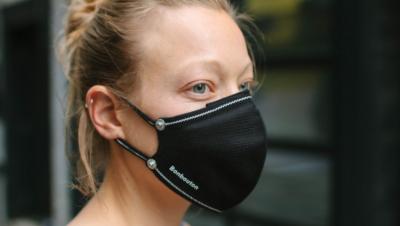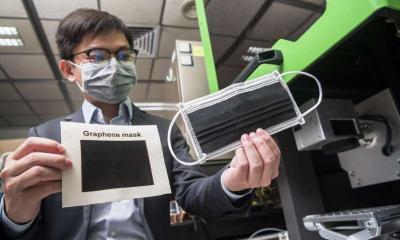The Coronavirus pandemic has been having a significant impact on the graphene market and industry. Even before the pandemic, graphene has already received much attention due to promising antimicrobial properties and demonstrated antiviral efficacy. However, there is no denying the recent urgency to put these traits to good use in combating the Coronavirus.
More than a few companies have launched graphene-enhanced textiles, inks and coatings, incorporated into personal protective gear (face masks, gloves etc.), and applications like air filters and room cleansers have been developed.
This has been seen both in companies that have already started in this route before the pandemic, and from ones that have done a bit of "tuning" of their portfolio. There has been some repurposing of smart materials to design effective systems for combating COVID-19. Functionalized graphene demonstrates a good viral capture capacity that, combined with heat or light-mediated treatments, could be used as a disinfectant. So, a strong emphasis on environmental sensors and filters is clearly seen. In addition, graphene sensors can be implemented on standard textiles and drug efficacy screening, also contributing to various PPE applications. Coatings for protection of surfaces are being developed, as well as disinfectant solutions and detergents containing graphene and related materials to clean surfaces.
Some examples of graphene-enhanced applications to battle the Coronavirus are:
- UK-based planarTECH and Thailand-based IDEATI have started marketing and distribution of its 2AM-branded graphene-enhanced antibacterial face masks.
- Haydale Graphene Industries announced that its partner IRPC has completed the development project with Haydale and started production of its new washable functionalized graphene-enhanced fabric mask.
- Versarien announced the launch of its first graphene-enhanced protective face mask, which utilizes Polygrene, Versarien’s graphene-enhanced polymer.
- A firm called Flextrapower (formerly Bonbouton) was created to leverage research originally created in Stevens labs for biomedical applications. Flextrapower has been developing several graphene-based applications, including the most recent COVID-focused effort, a graphene mask.

- A consortium of Spanish scientists and companies, in which the University of Granada (UGR) is participating, has been developing new efficient prophylactic facemasks to combat the Coronavirus responsible for COVID-19. These masks will be made of non-woven textiles specially modified with graphene and derivative materials.
- A research team from City University of Hong Kong (CityU) announced the production of graphene masks with a reported anti-bacterial efficiency of 80%, which can be enhanced to almost 100% with exposure to sunlight for around 10 minutes.

- Researchers at the Fraunhofer Institute for Reliability and Microintegration IZM have joined forces with partners in industry and healthcare to develop a graphene oxide based sensor platform to detect acute infections such as sepsis or the antibodies against the coronavirus within minutes.

- Caltech researchers have developed a new type of multiplexed test with a low-cost sensor that may enable the at-home diagnosis of a COVID infection through rapid analysis of small volumes of saliva or blood, without the involvement of a medical professional, in under 10 minutes.

- Grolltex has teamed up with Sanford Burnham Prebys Medical Discovery Institute to develop a graphene-based virus testing platform to help combat COVID-19. The project involves using handheld reader units and disposable plastic testing chips designed for U.S. points of entry including hospitals and point of care locations.
- G6 Materials (formerly Graphene 3D Lab) is optimizing the business model to accommodate the new reality of Covid-19. As part of this, G6 has developed a graphene-based air purification tech that could help fight the virus.
- University of Illinois researchers have used graphene to develop a rapid, ultrasensitive test using a paper-based electrochemical sensor that can detect the presence of the virus in less than five minutes.

